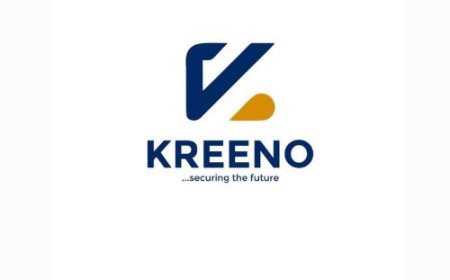Reducing Financial Fraud in Nigeria through Technology, Risk Management, and Corporate Governance
This research explores how modern technology, robust security risk management, and strong corporate governance practices contribute to reducing financial fraud in Nigeria. It highlights strategic innovations, fraud detection systems, and the role of ethical leadership in restoring financial sector integrity.

THE IMPACT OF MODERN TECHNOLOGY, SECURITY RISK MANAGEMENT, AND CORPORATE GOVERNANCE IN THE REDUCTION OF FINANCIAL FRAUD IN NIGERIA
By
Dr. Ohio O. Ojeagbase FICA, S.FIDR
Chief Private Investigator / CEO - Kreeno Consortium
Private Investigation, Debt Recovery, Criminal Prosecution, Cybersecurity
Email: drkreeno@gmail.com, info@kreenoholdings.com
Introduction
Financial fraud in Nigeria has caused major economic damage to both personal and corporate entities throughout recent years. Modern technology has created fresh opportunities to fight fraudulent activities which improve detection capabilities and strengthen security risk management approaches. The research investigates how technology functions as a vital tool for financial fraud detection and prevention whilst assessing conventional methods to understand their combined strength. The analysis will investigate how sound corporate governance practices help prevent fraud by creating transparent organizational cultures that enhance anti-fraud measures. The research includes relevant case studies demonstrating how Nigerian financial crimes have been successfully fought through technological implementations. The analysis will examine how technological progress interacts with regulatory systems to reveal potential developments for transforming Nigeria's financial sector.
The Role of Modern Technology in Detecting Financial Fraud In Nigeria
Modern technology has brought substantial changes to the financial fraud detection systems operating in Nigeria. Organizations have started to depend more heavily on digital tools and technologies for effective fraud detection during the recent years. The research by Onamusi et al. shows that digital measures serve as essential tools for financial fraud detection because these tools operate at a 1% significance level (Onamusi, Farouk, and Uyagu). The precise detection of anomalies in transactions and identification of suspicious behaviors depends on this level of precision which traditional methods cannot achieve. Through artificial intelligence and machine learning algorithms, organizations can process extensive data sets to detect patterns which signal fraudulent activities. The implementation of modern technologies enables businesses to detect fraud quickly whilst also using real-time monitoring systems to prevent potential threats. Financial operations become more transparent and accountable through digitization which reduces opportunities for deceptive practices. The implementation of modern technological applications has improved Nigerian organizations' ability to protect their assets whilst maintaining stakeholder trust. Financial fraud evolution demands institutions to adapt their strategies through technological implementation for effective management of this complex challenge.

Assessing the Effectiveness of Security Risk Management Strategies against Financial Fraud
Organizations need to establish powerful security risk management systems which combine detailed assessments with robust internal control measures to fight financial fraud effectively. Organizations should perform fraud risk assessments whilst creating frameworks to monitor financial transactions continuously. RO Ohando demonstrated in 2015 that security risk management for financial fraud requires identifying vulnerabilities and implementing risk mitigation strategies (Ohando). The approach requires both detection of fraudulent activities and preventive measures that protect against potential fraudsters. The combination of employee training for suspicious activity detection with established reporting channels creates an environment which reduces the chances of fraud occurrence. Technological solutions enhance these strategies through real-time monitoring tools and alert systems that detect financial behavior anomalies quickly. Security protocols need to be dynamic because they must adapt to new threats whilst maintaining alignment with corporate governance frameworks. Organizations can substantially lower their exposure to financial fraud by creating a transparent environment through specific security protocols and ongoing improvement efforts. These risk management strategies achieve their effectiveness through their capacity to adjust their responses to the continuously evolving financial crimes in Nigeria.
Corporate Governance Practices and Their Influence on Fraud Prevention in Nigerian Corporations
Corporate governance practices in Nigerian corporations need to be effective because they play a crucial role in preventing fraud. The absence of proper governance frameworks does not directly prevent fraud but better governance practices lead to an organizational culture that protects against fraudulent activities. According to S. Almustapha, F. Musa, and H. Saidu, Nigerian banks should actively engage with institutional investors and utilize their monitoring capabilities to enrich governance practices (Almustapha et al.). The organization becomes more transparent when all levels maintain accountability which reduces the likelihood of unethical behavior. The combination of corporate governance with internal control systems strengthens organizational defenses against potential fraud occurrences. Organizations that focus on ethical standards and compliance protocols develop stakeholder trust whilst building proactive risk management systems. Organizations must perform regular audits and governance policy evaluations to detect vulnerabilities which help improve detection systems before fraudulent activities become more serious. Employee education about ethical practices develops their sense of responsibility to detect financial misconduct red flags. The implementation of strong corporate governance practices simultaneously protects financial assets from fraud and strengthens organizational integrity which leads to sustained growth in Nigeria's corporate sector. Works Cited:Almustapha, S., Musa, F., and Saidu, H. "Corporate Governance Practices and Their Influence on Fraud Prevention in Nigerian Corporations." ANUK College of Private Sector Affairs, 2024 - anukpsaj.com.

Case Studies: Successful Implementation of Technology in Combating Financial Frauds in Nigeria
The previous discussion about corporate governance improvement demonstrates that financial fraud prevention in Nigeria receives substantial advantages from technological progress. The banking sector of Nigeria has implemented technological solutions through case studies to fight financial fraud effectively. IT leaders in Nigerian financial institutions have adopted digital solutions as their main fraud prevention strategy according to IA Ayodeji (Ayodeji). The research participants recognized five strategic methods that included advanced data analytics and machine learning algorithms and real-time transaction monitoring systems. These technologies help institutions detect fraudulent activities through pattern analysis and anomaly detection at a rapid pace. The implementation of biometric authentication systems provides an additional security measure which effectively decreases both identity theft and unauthorized access to sensitive data. Training programs that focus on technology usage enable employees to better detect threats and respond properly. The implementation of innovative tools in a proactive manner has resulted in a significant reduction of financial fraud occurrences within participating institutions. Modern technology strengthens corporate governance frameworks while building conditions that promote both compliance and ethical conduct. Nigerian financial institutions that invest in technological solutions gain better protection of their assets from fraud and build long-term stability and stakeholder trust. Works Cited: Ayodeji, I.A. “Case Studies: Successful Implementation of Technology in Combating Financial Frauds in Nigeria.” 2024 - search.proquest.com.
The Relationship between Corporate Culture and Fraud Detection Mechanisms in Nigeria
The fight against financial fraud through modern technology requires equal attention to corporate culture because it strengthens fraud detection systems in Nigeria's banking industry. Organizations with strong corporate cultures establish environments that value ethical conduct and integrity which shapes employee perspectives about fraud prevention and detection. The research by Aminat et al. shows that Nigerian deposit money banks' control environments directly impact their ability to detect and prevent fraud (Aminat et al.). Organizations that build strong corporate cultures based on transparency and accountability will have employees who feel secure to report suspicious activities. Such a culture promotes both the adherence to established protocols and the implementation of risk mitigation techniques. The alignment between corporate values and operational strategies strengthens the risk management framework of financial institutions. These mechanisms become stronger when organizations implement training programs that teach core values of integrity and vigilance to their staff members. A combination of positive corporate culture with advanced technological tools enables Nigerian financial institutions to develop an extensive system which prevents fraud and builds stakeholder trust. Banks that make cultural health and technological innovation their priorities will build stronger defenses against financial fraud while maintaining long-term organizational stability. Works Cited: Aminat, A.B., Ezekiel, A.I., and Obafemi, D.S. "The Relationship between Corporate Culture and Fraud Detection Mechanisms in Nigeria." researchgate.net.

The Future of Anti-Fraud Technologies and Their Potential to Transform Finance in Nigeria
The future of anti-fraud technologies shows great promise for transforming finance in Nigeria because of the changing financial fraud environment. The adoption of advanced technologies especially artificial intelligence (AI) by organizations enables them to fight and stop fraudulent activities more effectively. According to OA Bello and K Olufemi, AI technology innovations will play an essential part in protecting financial operations and improving the detection of economic data anomalies (Bello and Olufemi). These technological advancements enable real-time observation of extensive data sets which enables quick identification of potential security threats. The technologies develop their ability to detect new fraud tactics through adaptive learning from previous fraud patterns which results in improved prevention capabilities. Financial systems that incorporate AI technology enhance security protocols and create an environment which motivates stakeholders to make integrity and vigilance their daily operational priorities. The adoption of these technologies by Nigeria creates an opportunity to transform its financial sector through enhanced transparency and consumer trust and advanced risk management systems that combat complex fraud methods. The technological advancement will strengthen security protocols and create a more resilient financial ecosystem in Nigeria. Works Cited: Bello, O.A., and Olufemi, K. "The Future of Anti-Fraud Technologies and Their Potential to Transform Finance in Nigeria." Computer Science & IT Research Journal, 2024, researchgate.net.

The Interplay between Technological Advances and Regulatory Frameworks for Fraud
The relationship between technological progress and regulatory systems plays an essential role in reducing financial fraud within the complex Nigerian environment. Organizations that implement artificial intelligence (AI) and machine learning technologies achieve substantial improvements in their fraud detection systems. According to Bello et al. these technologies provide better transaction monitoring capabilities and dynamic fraud threat adaptation because fraud threats continuously change their landscape. The ability to adapt is vital because fraudsters are developing sophisticated methods that require regulatory frameworks to adjust their approach accordingly. The implementation of strong guidelines that support technological progress enables regulators to establish protective measures which promote responsible technology deployment. The regulatory framework should foster cooperation between financial institutions and technology providers and governmental agencies to enable efficient information sharing about new fraud tactics. The combination of technology with regulatory frameworks enables proactive fraud management which establishes integrity and accountability throughout financial systems. The strategic integration of these elements leads to the development of a stronger framework which safeguards against financial fraud in Nigeria while maintaining trust in economic transactions throughout time. The combination of these elements marks a major advancement toward developing a financial system that resists current threats. Works Cited: Bello, H.O., Idemudia, C., and Iyelolu, T.V. "The Interplay between Technological Advances and Regulatory Frameworks for Fraud Reduction." Journal of Advanced Research and Reviews, 2024.
Challenges and Opportunities in Integrating Technology with Traditional Fraud Prevention Methods
The combination of traditional fraud prevention methods with technology creates both obstacles and new possibilities during the fight against financial fraud. Organizations face difficulties when they attempt to merge their current systems with new approaches whilst developing comprehensive security frameworks. The research conducted by Oladejo and Jack (2020) shows that traditional audit mechanisms fail to stop contemporary fraud methods which requires a review of their operational integration with digital advancements (Oladejo and Jack). The detection tools provided by technology through data mining and machine learning serve as powerful instruments but traditional methods remain essential for identifying behavioral patterns that could lead to fraud. A balanced approach between technological dependence and traditional methods will create more successful fraud prevention strategies. The implementation of integrated systems faces multiple obstacles because staff members prefer traditional procedures and organizations struggle with inadequate technological infrastructure. The collaboration between stakeholders enables organizations to develop a shared understanding of fraud dynamics across different sectors through shared experiences. The combination of these approaches enables organizations to create improved training programs which teach professionals both technical expertise and ethical awareness for their work. A strategic approach that unites modern technology with established methods will create substantial improvements in Nigeria's fight against financial fraud. Works Cited: Oladejo, M.T., and Jack, L. "Challenges and Opportunities in Integrating Technology with Traditional Fraud Prevention Methods." International Journal of Economics, 2020.

Conclusion
The fight against financial fraud in Nigeria requires multiple strategies which combine modern technology with strong security risk management practices and effective corporate governance. The implementation of advanced technologies has improved fraud detection processes while creating opportunities to combine them with established methods according to the evidence presented throughout this paper. Organizations that implement strong corporate governance systems develop transparent cultures and acquire essential tools to prevent financial misconduct risks. The future development of anti-fraud technologies shows promise to transform Nigeria's financial systems by lowering fraud occurrences significantly. The transformation requires regulatory frameworks that adapt to new threats and maintain compliance across different sectors. Nigeria will achieve significant progress toward building a secure financial environment for sustainable economic growth through collective stakeholder commitment from government bodies and corporate entities and individual members.
Citations
Onamusi, Gift Ejomavueya, et al. "Effect of Digital Forensic Accounting Technological Tools on Cyber Financial Fraud Detection Among Quoted Deposit Money Banks in Nigeria." International Journal Of Capacity Building In Education And Management 6.5 (2024): 45-57. [1]
Ohando, Ronald O. Relationship between fraud risk management practices and financial performance of commercial banks in Kenya. Diss. University of Nairobi, 2015. [2]
Almustapha, Sadiya, Farouk Musa, and Halidu Saidu. "Effect Of Corporate Governance Mechanisms On Electronic Fraud Prevention In Listed Deposit Money Banks In Nigeria." ANUK College of Private Sector Accounting Journal 1.1 (2024): 182-190. [3]
Ayodeji, Ibukunoluwa Adetola. Fraud Detection and Prevention in the Nigerian Financial Industry. Diss. Walden University, 2024. [4]
Aminat, Azeez Bolanle, Ajayi Ibidolapo Ezekiel, and Dada Samuel Obafemi. "The Impact of Internal Control Mechanisms on Fraud Detection and Prevention in Nigeria Deposit Money Banks." [5]
Bello, Oluwabusayo Adijat, and Komolafe Olufemi. "Artificial intelligence in fraud prevention: Exploring techniques and applications challenges and opportunities." Computer science & IT research journal 5.6 (2024): 1505-1520. [6]
Bello, Halima Oluwabunmi, Courage Idemudia, and Toluwalase Vanessa Iyelolu. "Integrating machine learning and blockchain: Conceptual frameworks for real-time fraud detection and prevention." World Journal of Advanced Research and Reviews 23.1 (2024): 056-068. [7]
Oladejo, Musbaudeen Titilope, and Lisa Jack. "Fraud prevention and detection in a blockchain technology environment: challenges posed to forensic accountants." International Journal of Economics and Accounting 9.4 (2020): 315-335. [8]
What's Your Reaction?




































































































